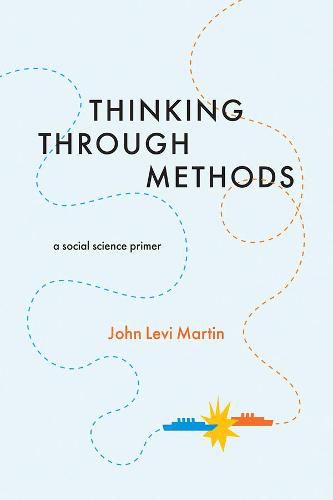Readings Newsletter
Become a Readings Member to make your shopping experience even easier.
Sign in or sign up for free!
You’re not far away from qualifying for FREE standard shipping within Australia
You’ve qualified for FREE standard shipping within Australia
The cart is loading…






Sociological research is hard enough already-you don’t need to make it even harder by smashing about like a bull in a china shop, not knowing what you’re doing or where you’re heading. Or so says John Levi Martin in this witty, insightful, and desperately needed primer on how to practice rigorous social science. Thinking Through Methods focuses on the practical decisions that you will need to make as a researcher-where the data you are working with comes from and how that data relates to all the possible data you could have gathered.
This is a user’s guide to sociological research, designed to be used at both the undergraduate and graduate level. Rather than offer mechanical rules and applications, Martin chooses instead to team up with the reader to think through and with methods. He acknowledges that we are human beings-and thus prone to the same cognitive limitations and distortions found in subjects-and proposes ways to compensate for these limitations. Martin also forcefully argues for principled symmetry, contending that bad ethics makes for bad research, and vice versa. Thinking Through Methods is a landmark work-one that students will turn to again and again throughout the course of their sociological research.
$9.00 standard shipping within Australia
FREE standard shipping within Australia for orders over $100.00
Express & International shipping calculated at checkout
Sociological research is hard enough already-you don’t need to make it even harder by smashing about like a bull in a china shop, not knowing what you’re doing or where you’re heading. Or so says John Levi Martin in this witty, insightful, and desperately needed primer on how to practice rigorous social science. Thinking Through Methods focuses on the practical decisions that you will need to make as a researcher-where the data you are working with comes from and how that data relates to all the possible data you could have gathered.
This is a user’s guide to sociological research, designed to be used at both the undergraduate and graduate level. Rather than offer mechanical rules and applications, Martin chooses instead to team up with the reader to think through and with methods. He acknowledges that we are human beings-and thus prone to the same cognitive limitations and distortions found in subjects-and proposes ways to compensate for these limitations. Martin also forcefully argues for principled symmetry, contending that bad ethics makes for bad research, and vice versa. Thinking Through Methods is a landmark work-one that students will turn to again and again throughout the course of their sociological research.